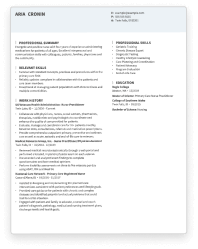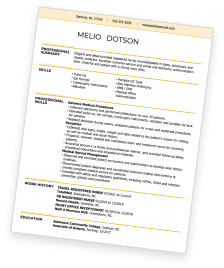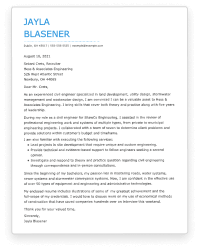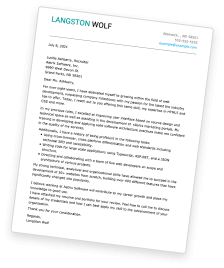Engineering Resumes: Overview
Engineering professionals play a pivotal role in shaping the world around us. Whether you’re a mechanical engineer, electrical engineer, or a manager overseeing complex engineering projects, your contributions are integral to innovation and progress.
In the diverse realm of engineering, you may find yourself in various roles, including:
- Mechanical Engineer
- Electrical Engineer
- Civil Engineer
- Software Engineer
- Project Manager
To excel in engineering, possessing exceptional technical skills, problem-solving abilities, creativity, and a strong focus on innovation is crucial. Your engineering resume should highlight these qualities to stand out in the competitive job market.
Explore our extensive collection of resume examples and resume templates to embark on your journey toward engineering excellence. Build a resume with Hloom today!
Civil Engineer Resume Example
This civil engineer resume example is a great template thanks to its design and content choices. Take a look to see how you can use this to write your next resume!
-
Clean and Organized Layout:
The resume's layout is easy to navigate due to its clear headings and well-organized sections. With enhanced readability, this resume promotes a thoughtful appearance.
-
Relevant Experience:
The resume prominently showcases relevant engineering experience, highlighting the candidate's expertise in tackling complex challenges and driving innovative solutions.
-
Quantifiable Achievements:
Accomplishments, such as successfully optimizing processes to increase productivity, demonstrate the candidate's value and impact.
-
Balanced Use of White Space:
Effective utilization of white space makes the resume visually appealing and prevents overcrowding.
Environmental Engineer Resume Example
Use this environmental engineer resume as a template and pay special attention to its professional design and qualifications.
-
Professional Design:
Thoughtful font selection along with minimal coloring enhances the overall professionalism and legibility of this engineering resume example.
-
Dedicated Skills Section:
A dedicated skills section lists a diverse range of engineering skills, underscoring the candidate's capabilities.
-
Visual Hierarchy:
The resume skillfully employs visual cues to guide the reader's focus to critical sections, particularly with the effective use of horizontal lines as borders between sections.
-
Tailored to the Job:
The resume effectively aligns the candidate's experience and skills with the requirements of the role, in this case, environmental engineering.
How to Write an Engineering Resume: A Step-by-Step Guide
Crafting an effective engineering resume is vital to securing your dream job in this field. Follow our comprehensive step-by-step guide to create a standout resume that impresses employers.
-
Contact Information:
Start with your contact details at the top of your resume. Include your full name, phone number, professional email address, and location (city and state). Ensure your contact information is accurate and up-to-date to facilitate easy communication with potential employers.
-
Resume Summary or Objective:
Compose a compelling resume summary or objective statement that provides a snapshot of your qualifications and career aspirations. A resume summary typically highlights your professional experience, skills, and accomplishments, making it suitable for those with relevant work history. In contrast, a resume objective is ideal for entry-level candidates or career changers, focusing on your career goals and how they align with the job you're applying for.
-
Work History:
Detail your work experience in reverse chronological order, beginning with your most recent job. Include the job title, company name, dates of employment, and a list of key responsibilities and achievements for each role. Focus on how you contributed to project success, innovation, and problem-solving. Use action verbs to describe your accomplishments and quantify your achievements wherever possible.
-
Education:
Highlight your educational background, starting with your highest level of education. Include the institution's name, degree earned, major (if applicable), and graduation date. If you've completed any relevant certifications or training programs, mention them here as well. This section provides context for your qualifications and demonstrates your commitment to professional development.
-
Skills:
Create a dedicated skills section to showcase your engineering-related skills. Emphasize attributes like proficiency in CAD software, coding languages, technical drawing, project management, and any industry-specific tools. Use bullet points for clarity and provide examples of how you've applied these skills in your previous roles. This section allows employers to identify your strengths and abilities quickly.
-
Additional Sections:
Depending on your unique qualifications and experiences, consider adding additional sections to enhance your resume further and make it stand out. Additional sections could include certifications, volunteer experience, awards, and professional affliations.
Key Skills and Certifications For Engineering Resumes
In the competitive realm of engineering, possessing the right skills and certifications can set you apart as a top candidate. Here, we outline the essential hard skills and soft skills, as well as valuable certifications to elevate your engineering resume.
Top 5 Hard Skills for Engineering:
Technical Proficiency: Mastery of engineering software, CAD tools, and industry-specific technology enhances your ability to design, analyze, and optimize complex systems.
- Problem-Solving: Engineers are adept at identifying and solving intricate problems. Showcase your ability to analyze data, innovate solutions, and contribute to project success.
- Project Management: Proficiency in project management methodologies, such as Agile or Six Sigma, demonstrates your ability to lead and execute engineering projects efficiently.
- Technical Drawing: Proficient technical drawing skills using software like AutoCAD or SolidWorks ensure precise communication of design concepts and specifications.
- Coding and Programming: Familiarity with coding languages like Python, Java, or C++ is increasingly valuable in various engineering disciplines, enabling automation and advanced analytics.
Top 5 Soft Skills for Engineering:
- Communication: Effective verbal and written communication skills are crucial for collaborating with cross-functional teams, presenting ideas, and preparing reports and documentation.
- Analytical Thinking: Engineers excel in analytical thinking, allowing them to assess data, identify patterns, and make informed decisions to drive project outcomes.
- Attention to Detail: Meticulous attention to detail ensures accuracy in design, calculations, and quality assurance processes, minimizing errors and optimizing efficiency.
- Teamwork and Collaboration: Engineering projects often involve multidisciplinary teams. Highlight your ability to collaborate, share knowledge, and contribute to a positive team dynamic.
- Adaptability: The engineering field evolves rapidly. Showcase your adaptability to changing technologies and methodologies, ensuring you stay relevant and innovative.
Top 5 Certifications for Engineering:
- Professional Engineer (PE) Certification: This prestigious certification demonstrates your expertise and commitment to ethical engineering practices. PE licensure is often required for senior engineering roles.
- Certified Project Management Professional (PMP): PMP certification is valuable for engineers pursuing leadership roles, as it validates your project management skills and knowledge.
- Certified SolidWorks Associate (CSWA): If you work extensively with 3D modeling and design, this certification attests to your proficiency in SolidWorks software.
- Engineer-in-Training (EIT) or Engineer Intern (EI): This certification is essential to earning your PE license. It demonstrates your commitment to advancing your engineering career.
- Certified Six Sigma Green Belt (CSSGB): If you’re involved in process improvement or quality control, this certification indicates your expertise in Six Sigma methodologies.
Elevate your engineering resume by incorporating these key hard and soft skills and valuable certifications. Demonstrating your expertise in these areas will make you a sought-after candidate in the engineering industry.
Helping Job Seekers Like You
11 Tips For Writing An Engineering Resume
Crafting an effective engineering resume requires careful attention to detail and a strategic approach. Follow these essential tips to ensure your resume stands out in the competitive job market:
- Tailor Your Resume: Customize your resume for each engineering job application. Emphasize relevant skills and experiences that match the specific job requirements. Use keywords from the job description to catch the recruiter’s eye.
- Quantify Achievements: Use numbers and metrics to quantify your engineering accomplishments. For example, mention how you improved efficiency by a certain percentage or reduced project costs. Quantifiable achievements make your impact tangible.
- Highlight Technical Skills: Engineering is a technical field, so make sure to showcase your technical skills. List software, tools, and technologies you are proficient in, especially those mentioned in the job posting.
- Emphasize Problem-Solving: Engineers are problem solvers. Highlight your ability to identify complex issues, develop innovative solutions, and contribute to project success. Use specific examples to demonstrate your problem-solving prowess.
- Showcase Project Experience: Discuss your engineering project experience in detail. Include project names, your role, key responsibilities, and the results achieved. Mention any patents, publications, or awards related to your projects.
- Include Relevant Certifications: If you possess engineering certifications or licenses, feature them prominently. Certifications like the Professional Engineer (PE) or industry-specific credentials can enhance your credibility.
- Use a Professional Format: Maintain a clean, organized layout with clear headings and bullet points to enhance readability. Choose a professional font, and ensure consistent formatting throughout your engineering resume.
- Craft a Strong Summary: Write a concise yet compelling professional summary at the beginning of your resume. It should grab the employer’s attention, convey your career goals, and highlight your value to the organization.
- Highlight Relevant Work Experience: Your work history should focus on engineering positions that directly relate to the job you’re applying for. Describe your responsibilities and achievements in each role, emphasizing those that align with the job’s requirements.
- Keep It Concise: Aim for a resume length of one page for early-career engineers and a maximum of two pages for experienced professionals. Conciseness ensures that recruiters quickly identify your key qualifications.
- Proofread Thoroughly: Avoid errors by proofreading your engineering resume carefully. Typos and grammatical mistakes can detract from your professionalism. Consider asking a friend or colleague to review it as well.
By following these tips, you can create an engineering resume that effectively communicates your skills, experience, and dedication to potential employers, increasing your chances of landing your desired engineering role.


Save Time With Our Resume Builder
Key Takeaways
Tailor your engineering resume for each job application by highlighting relevant skills and experiences that match the specific job requirements. Use keywords from the job description to catch the recruiter's eye.
Focus your work history on engineering positions that directly relate to the job you're applying for. Describe your responsibilities and achievements, emphasizing those that align with the job's requirements.
To make your impact tangible, use numbers and metrics to quantify your engineering accomplishments. Mention how you improved efficiency, reduced costs, or contributed to project success.
Showcase your technical prowess by listing the software, tools, and technologies you are proficient in, especially those mentioned in the job posting.
Avoid errors by proofreading your engineering resume carefully. Typos and grammatical mistakes can detract from your professionalism. Consider asking a friend or colleague to review it as well.
Save Time With Our Cover Letter Builder








